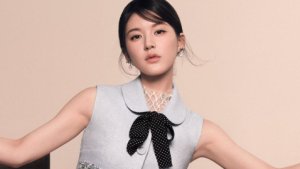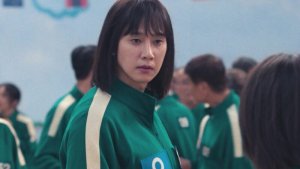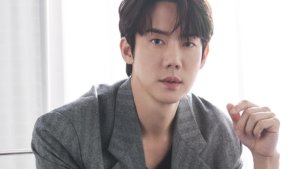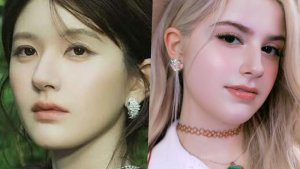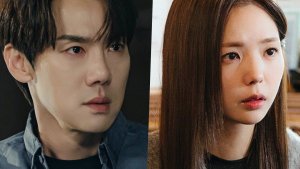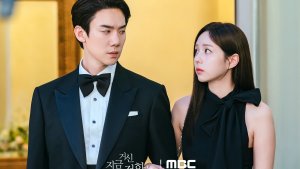 'When the Phone Rings' sparks outrage for misrepresentation of Israel-Palestine conflict
'When the Phone Rings' sparks outrage for misrepresentation of Israel-Palestine conflict
*SPOILER ALERT*
Hi, there I’m @Namsparkswit7.
I've recently come across a trend among K-drama writers which is to incorporate realistic issues as an element to solely build the plot of their dramas. This can lead to a false depiction of the issues being presented. After watching dramas such as It's Okay To Not Be Okay and Itaewon Class, I saw a lot of comments from certain viewers wishing that they were like the FLs in these dramas despite their intolerable acts in the drama. The representation of these individuals, as well as two others I'll discuss, may have a detrimental impact on people in real life, therefore I thought it was important to bring this to attention.
Moon Sang Tae (IT’S OKAY TO NOT BE OKAY)
It's Okay To Not Be Okay is a psychological healing drama about Moon Gang Tae who works as a caregiver at a psychiatric ward, who also happens to be his brother, Moon Sang Tae's guardian due to his brother being autistic. Ko Mun Yeong is a popular child literature writer that suffers from Antisocial Personality Disorder which makes her seem extremely selfish, arrogant, and rude. On the road to healing, she falls in love with Moon Gang Tae, who unknowingly denies love.
I was delighted after finding out that an autistic character was going to be one of the key characters in this K-drama, but the representation of the character surprised me a lot. While I realize that having to be a guardian for an autistic person isn't always easy, the repeated presentation of Sang Tae as a burden or a nuisance was rather upsetting for me. This is because Gang Tae's character (Sang Tae's brother) was designed to be one who desired freedom from the shackles that bound him, and that shackle was Sang Tae. I understand that the writer intended to convey a positive message about the autistic community, however, it was delivered in an ineffective manner.
Autism is still a delicate issue in society since only a small percentage of the population is educated about it. According to studies, the media has had a significant influence on how the autistic community is seen by others, owing to the preconceptions that are commonly linked with the representation of autistic individuals. People frequently assume that autistic people are of low intelligence, awkward, have unique abilities, are obsessive, difficult to understand and have poor communication skills. Because of these stereotypes, some people are afraid to reveal their autism diagnosis, and others end up with delayed diagnosis because they do not fit the stereotypical symptoms of autism. As a result, they cannot get the necessary help they need. Also people's perceptions of them would make them feel like a burden.
As I previously said, Moon Sang Tae was repeatedly presented as a nuisance and obsessive, which sadly affirms that his character just reinforces the prejudices which the media perpetuates. Some of the symptoms Sang Tae's character depicted were accurate but they were just too stereotypical.
His character should've been depicted differently since such representations would just foster the cycle of autistic people feeling helpless and others being judgmental of them.
Ko Mun Yeong (IT’S OKAY TO NOT BE OKAY) and Jo Yi Seo (ITAEWON CLASS)
Park Saeroyi's life has been turned upside down after he gets expelled from school for punching a bully and his father is killed in an accident. Following his father's steps, he opens a pub named "DanBam" in Itaewon and, along with his manager and staff, strive towards success and reaching greater heights. -(MDL - Itaewon Class)
Jo Yi Seo is the FL of this drama and is said to be 70% sociopathic. She has also shown sociopathic tendencies that demonstrates she had a IDGAF attitude as well as making racist and transphobic statements she never properly apologized for. Additionally sexual assault when she kissed the ML while he was under the influence of alcohol.
Similar actions were seen with the character Ko Mun Yeong, who also unpleasantly touched the ML, and threathened, and even kidnapped, the ML's brother.
After doing some research, I realized that Ko Mun Yeong and Jo Yi Seo are both a romanticization of antisocial personality disorder (ASPD). Romanticization is the act of speaking about something in a way that makes it sound better than it is, or the act of believing that something is better than it is, due to idealisation and sentimentalisation. Both Jo Yi Seo and Ko Mun Yeong suffered from the same disorder, which was depicted in an unrealistic manner:
Both of these leads had engaged in undeniably creepy behaviors such as sexual harassment, stalking and threatening. But, in the end, we see that they both fall in love with their MLs which was the problem. Let me state unequivocally that it has not been scientifically proven that a person with ASPD can generate these kinds of feelings. So, despite the unpleasant things that the FLs have done, the writers had them fall in love, proving my point that the mental condition was employed as an element to bring the main couples together, indicating romanticization.
Also, the fact that those who liked both characters defend their behavior by claiming it was because of their disorder backs up my contention that both characters are a romanticization of ASPD. Others may argue that both characters developed and changed, but that is precisely what I'm getting at here. The character development was completely false because, again, a person with ASPD is never likely to go through such growth that causes them to fall in love, as shown with Ko Mun Yeong and Jo Yi Seo.
Because of this lacking portrayal, some may believe that a person with ASPD may love them like Jo Yi Seo or Ko Mun Yeong did. This might also result in a misinterpretation of assault for romance. In actuality, if certain people with ASPD treat others in the same way as Ko Mun Yeong and Jo Yi Seo treated their MLs, it might lead to really terrible things. I know it might sound like I'm overreacting, but I’m just trying to demonstrate how depiction in entertainment can influence our lives as viewers. After all, some of the people who suffer from ASPD are a danger to society.
The way these two were portrayed obviously indicated criminal tendencies but they turned the atrocious things they'd done into grounds for romance to develop between the couples. What made Itaewon Class even creepier was the fact that Jo Yi Seo had developed feelings for Saeroyi, who was in his thirties at the time, while she was still in high school. She fell in love with a person after just one encounter; before even getting to know him, she dropped out of college for him, engaged herself in his business, followed him around, kissed him without his consent, confessed, and boom, she expects him to be in love with her. And people call that romantic? She practically sounds like a stalker.
If someone with ASPD were to act like Jo Yi Seo to someone else in real life, the odds of the person being seriously hurt are quite high. But the writers ignored the reality of the mental situation and probably thought, "UwU, that's romantic!" like seriously c'mon...
The writer's should've depicted these characters mental states accurately just like they would have done if the character was a serial killer, because using the characteristics of a person who suffers from ASPD to depict FLs as "badass" or "strong" is just unacceptable. Without romanticizing, a FL can be "strong" and "independent" like its been depicted in characters like Hotel Del Luna's Jang Man Weol, who had legitimate reasons to act like she did, Law School's Kang Sol A, Voice's Kwon Won Joo, and surprisingly Vincenzo's Hong Cha Young.
Most importantly, ASPD is a mental condition that does not receive the same level of sensitivity that anxiety or depression does, thus romanticizing it is both incorrect and repulsive.
True Beauty
True Beauty is a romantic comedy about a high school girl Lim Ju Gyeong, who rises to pretty girl fame after she masters the art of make-up from YouTube. She turns into a goddess because of her makeup skills, but would rather die than reveal her bare face to anyone. It tells her love story with the only boy that saw her without makeup, Lee Su Ho. Lee is an attractive and handsome boy who appears cold because of his dark past but is actually very caring. They grow when they meet each other sharing their secrets and finding love with each other, but can Su Ho make Ju Gyeong find her true beauty? - (MDL - True Beauty)
Anyone can conclude from the title of the drama that it will be a slice of life drama that chronicles the lives of its characters as they discover their 'true beauty.' That is, at least, what I had assumed. But it wasn't like that at all. They did show the main character's vulnerabilities quite well, but in order for her to develop, she had to wind up in a clichéed love triangle with two attractive males who took the limelight from what the story's subject was intended to be about. To make it worse, the MLs task was to help the FL discover her true beauty.
It was really disappointing to see that the writers had simply used society's toxic beauty standards as an element to create another cliched love triangle drama. Rather than retiring society's beauty standards, they accomplished the opposite, as seen by the viewer's mesmerization of the MLs throughout the drama. I noticed among the drama's fandom that what they really cared about was who was gonna "get the girl" and who, between Suho and Seojun (the MLs), was hotter. And why was that? Because they were made into the main focus that would determine the direction or development of the FL's life.
The main character's desire to conceal her face promoted ideas like:
- If you apply make-up to hide your face you'll be acknowledged by people you're attracted to
- Make-up will make you feel accepted
- If you're pretty you can get away with anything
- You need someone to help you realize your self-worth.
These messages could've been delivered differently because it might be harmful, especially to younger viewers, who are new to the judgemental society we live in, as well as the changes their bodies go through.
Some might argue that True Beauty is an enlightening drama that sheds light on the effects of societal norms but no, it didn't. It only shed light on the advantages of throwing your real self away in order to fit into society's standards. This was shown through the depiction of Suho and Seojun as the kings of the high school because of their good looks and in fact, Joo Gyung feeling 'accepted' after her makeover clearly demonstrates the drama giving the spotlight to the advantages of fitting into society's toxic standards.
Their message, which was supposed to be that society would only care about a person's physical appearance and not a person's true inner beauty, and that, as a result, we should seek the beauty that lies within us, was poorly executed. Because at the end of the day, most viewers only cared about the 'visuals' of the characters. Ironic isn't it?
As someone who sincerely loves K-dramas I hope the writers who depict real issues half-heartedly would stop because issues like these, in one way or the other, affects our lives and the last thing we would want is to be negatively impacted by the perceptions we were given from the things we love.
Bye, everyone! It’s my first article here so I hope this isn’t too messy to understand. Comment what you think, and I hope you have a great day :)
Edited by: KimWanHee (1st editor)


